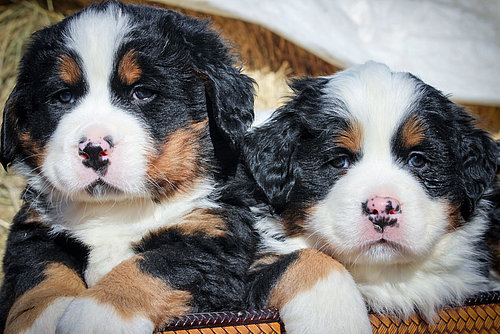If you’re curious about Bernese Mountain Dogs and their adorable noses, you’ve come to the right place! So, do Bernese Mountain Dogs’ noses turn black? Let’s find out together!
Well, let me tell you, Bernese Mountain Dogs have some nose-some facts to share! Now, you might be wondering if their noses follow the classic black color seen in many dog breeds. It’s true! Bernese Mountain Dogs typically have noses that turn black as they grow older. Isn’t that fascinating?
So, whether you’ve seen Bernese Mountain Dogs with black noses or are considering getting one, it’s important to know that their noses usually start out a lighter shade, such as pink or brown, when they’re pups. However, as they mature, you’ll notice their noses gradually transforming into a lovely, solid black color.
Isn’t it intriguing to see how these adorable pups develop their nose color over time? Now that we’ve answered the question, let’s dive deeper into the particulars of Bernese Mountain Dogs and their fascinating features!
Bernese Mountain Dogs are known for their distinctive black noses. However, their noses don’t always start out black. When they are born, their noses are usually pink, and they gradually darken as they grow. By the time they reach adulthood, their noses should be fully black. This color change occurs due to a process called depigmentation. It’s fascinating to watch the transformation from pink to black as these lovable dogs mature!

Do Bernese Mountain Dogs Noses Turn Black? The Truth About Their Unique Feature
Bernese Mountain Dogs are known for their majestic appearance and distinctive markings. One intriguing feature of these lovable dogs is their noses, which are often black. However, not all Bernese Mountain Dogs have black noses. In this article, we will explore the fascinating topic of Bernese Mountain Dogs’ noses and discover why some turn black while others may have a different color.
Why Do Some Bernese Mountain Dogs Have Black Noses?
When we think of Bernese Mountain Dogs, we often picture their striking jet-black noses. This is the most common coloration for their noses, and it adds to their overall charm and beauty. So, what causes these dogs to have black noses? The answer lies in their genetics. Bernese Mountain Dogs carry a gene called the “black nose gene.” This gene is responsible for the production of a pigment called melanin, which gives the nose its black color.
The development of a black nose in Bernese Mountain Dogs occurs as they mature. When they are puppies, their noses may be pink or light brown. However, as they grow older, the black pigment sets in, resulting in their characteristic black noses. Most Bernese Mountain Dogs will have a fully black nose by the time they are around one and a half years old.
It is important to note that not all Bernese Mountain Dogs will have black noses. Some may have noses of a different color, such as brown or even partially pink. This variation is due to genetic diversity within the breed and does not affect the dog’s health or overall quality. While black noses are the norm, different nose colors add to the uniqueness of individual Bernese Mountain Dogs.
Factors Affecting Nose Color in Bernese Mountain Dogs
While black noses are the standard in Bernese Mountain Dogs, there are certain factors that can influence the color of their noses. Let’s take a closer look at these factors:
1. Genetics:
As mentioned earlier, genetics play a significant role in determining the color of a Bernese Mountain Dog’s nose. The presence or absence of the black nose gene and other gene variations can result in dogs with noses of different colors. It is important to remember that nose color does not affect the dog’s health or abilities in any way.
Genetic Variations:
There are rare cases where Bernese Mountain Dogs may possess genetic variations that result in nose colors other than black. These variations can produce dog with noses that are either partially pigmented or completely lacking melanin. Again, it is essential to understand that these variations are harmless and do not impact the dog’s well-being.
Despite these genetic variations, breeders generally strive to maintain the standard black nose color in Bernese Mountain Dogs to preserve the breed’s overall appearance and characteristics.
2. Sun Exposure:
Sun exposure can also affect a Bernese Mountain Dog’s nose color. Just like humans, dogs can experience changes in pigmentation due to sun exposure. Prolonged exposure to the sun’s UV rays can cause the nose to become lighter or develop spots of pink. This is known as “snow nose” or “winter nose.” The condition is typically temporary, and the nose will darken again when the dog’s sun exposure decreases.
3. Temperature:
The temperature can have a minor influence on a Bernese Mountain Dog’s nose color. Some dogs may have noses that appear lighter or darker depending on the ambient temperature. Cold weather can cause the nose to become slightly paler, while warmer temperatures may result in slight darkening. However, these changes are minimal and have no impact on the dog’s overall health or well-being.
4. Health Conditions:
While rare, certain health conditions can cause changes in a Bernese Mountain Dog’s nose color. These conditions may include vitiligo, a condition that results in the loss of pigmentation in the skin, including the nose. If you notice any abnormal changes in your dog’s nose color or any other concerning symptoms, it is best to consult with a veterinarian to rule out any potential health issues.
#Do Bernese Mountain Dogs Need Special Nose Care?
The Importance of Proper Nose Care for Bernese Mountain Dogs
Just like any other part of a dog’s body, a Bernese Mountain Dog’s nose requires proper care to ensure its health and well-being. Here are a few tips to keep your dog’s nose in top shape:
1. Regular Cleaning:
Keep your Bernese Mountain Dog’s nose clean by gently wiping it with a damp cloth to remove any dirt or debris. Avoid using harsh chemicals or human skincare products, as these can be irritating to the dog’s sensitive nose. If you notice excessive dryness or cracking, consider using a dog-specific nose balm or moisturizer to keep the skin hydrated.
2. Protection from the Sun:
Protect your dog’s nose from excessive sun exposure, especially during peak hours when the sun’s rays are strongest. Consider using pet-safe sunscreen or providing shade for your dog when spending time outdoors. This will help prevent sunburn and keep the nose’s natural pigmentation intact.
3. Regular Veterinary Check-ups:
Include your Bernese Mountain Dog’s nose in their regular veterinary check-ups. A veterinarian can examine the nose for any signs of abnormalities or underlying health conditions. They can also provide guidance on proper nose care based on your dog’s individual needs.
In conclusion, Bernese Mountain Dogs are known for their striking black noses, but not all dogs of this breed will have black noses. Nose color variations can occur due to genetics, sun exposure, temperature, and, in rare cases, health conditions. It is important to remember that nose color does not affect a dog’s health or quality. Proper nose care, including regular cleaning and sun protection, can help ensure the overall health and well-being of your Bernese Mountain Dog’s nose.
Key Takeaways: Do Bernese Mountain Dogs Noses Turn Black?
- Bernese Mountain Dogs are born with a pink nose
- As they grow older, their noses start to turn black
- The process of the nose turning black is called “nose pigmentation”
- It is a normal and natural change in the breed
- However, some Bernese Mountain Dogs may have lighter-colored noses throughout their lives
Frequently Asked Questions
Here are some common questions about Bernese Mountain Dogs and their black noses:
1. Why do Bernese Mountain Dogs have black noses?
Bernese Mountain Dogs have black noses due to their genetic makeup. The black pigmentation is a result of specific genes that control the production of melanin, the pigment responsible for the color of skin, hair, and eyes.
This dark pigmentation in their noses helps protect them from the sun’s harmful ultraviolet rays. Additionally, it enables them to better detect scents using their powerful sense of smell.
2. Is it normal for a Bernese Mountain Dog’s nose to change color?
Yes, it is normal for a Bernese Mountain Dog’s nose to change color. When Bernese Mountain Dogs are puppies, their noses are often a lighter shade, sometimes appearing pink or brown. As they mature, their noses gradually darken and typically turn black by the time they reach adulthood.
However, changes in nose color can occur throughout their lives. For example, if a Bernese Mountain Dog spends a lot of time in the sun, their nose may become temporarily lighter or fade due to sun exposure. If you notice any significant changes or abnormalities, it’s always best to consult with a veterinarian.
3. Can a Bernese Mountain Dog’s nose turn black after it has been pink or faded?
Yes, it is possible for a Bernese Mountain Dog’s nose to turn black even if it has been pink or faded. The darkening of a dog’s nose is generally a natural process as they age, and the color may change over time.
However, if your dog’s nose has faded or turned pink and remained that way for an extended period, it could indicate a health issue or a condition called “dudley nose.” Dudley nose is a rare condition in which the pigment in a dog’s nose gradually disappears, causing it to lose its normal color. If you have concerns, contact a veterinarian for a proper evaluation.
4. Are there any medical conditions that can affect the color of a Bernese Mountain Dog’s nose?
Yes, certain medical conditions can affect the color of a Bernese Mountain Dog’s nose. For instance, discoid lupus erythematosus (DLE) is an autoimmune disease that can cause the nose to lose pigment and develop sores or scabs. Nasal depigmentation can also be a symptom of Zinc-Responsive Dermatosis (ZRD), a condition that affects a dog’s ability to properly absorb zinc from their diet.
If you notice any changes in your dog’s nose, such as unusual color, sores, or other abnormalities, it’s important to consult with a veterinarian for an accurate diagnosis and appropriate treatment.
5. Can I do anything to maintain my Bernese Mountain Dog’s nose color?
While a Bernese Mountain Dog’s nose color is largely determined by genetics, there are some steps you can take to help maintain its dark pigmentation. Providing shade and protecting your dog’s nose from excessive sun exposure can prevent temporary lightening or fading.
Additionally, keeping your dog’s nose moisturized with dog-safe, non-toxic balms or ointments can help prevent dryness and cracking. Regularly checking your dog’s nose for any changes or abnormalities can also help detect potential health issues early on, allowing for timely intervention if needed.

Summary
So, do Bernese Mountain Dogs’ noses turn black? The answer is yes! These adorable dogs are born with pink noses that gradually turn black as they grow older. This change in nose color is a normal part of their development and is nothing to worry about.
This transformation is due to a pigment called melanin, which is responsible for the color of the skin, hair, and eyes. As Bernese Mountain Dogs mature, the production of melanin increases, causing their noses to change from pink to black. So, if you have a Bernese Mountain Dog with a pink nose, don’t be surprised if it turns black as they get older – it’s just a natural and beautiful part of their growth!